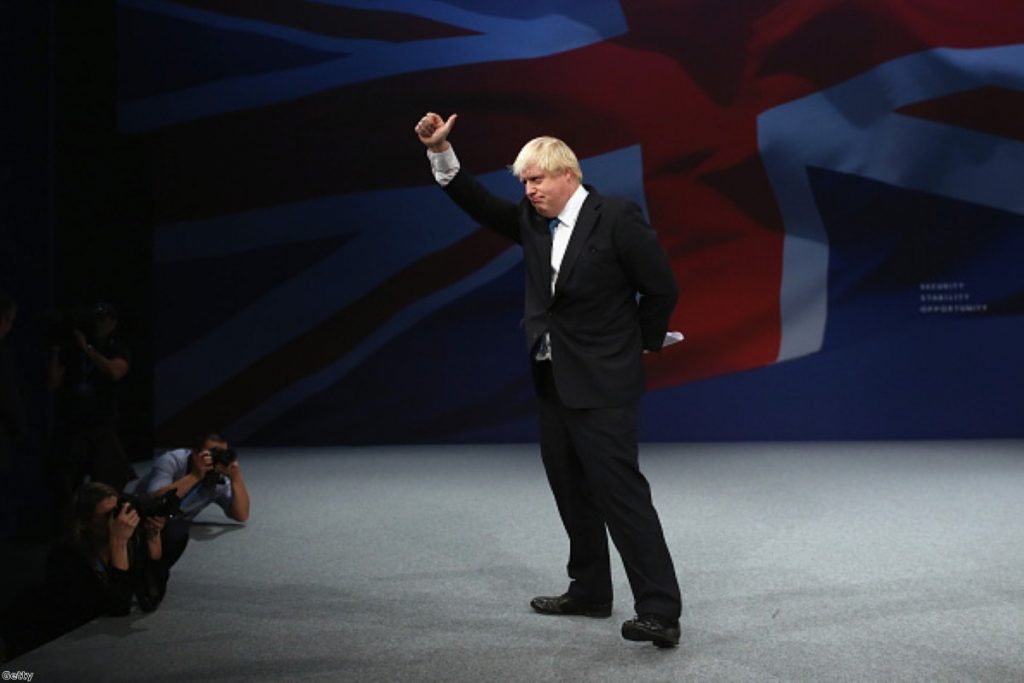Boris Johnson shows why it’s far too early to count him out
Over my years covering London politics I have watched literally hundreds of speeches by Boris Johnson. Pretty much all of them have melded into one. Normally the relationship between the content of Boris's speeches and the event he has been asked to speak at is so loose as to be non-existent. Whether he's speaking to a room full of Sikhs, or the Conservative party conference, the message and the jokes are almost always the same. If I never hear another gag about selling cake to France again, it will be too soon.
So it was striking that he chose today to deliver what was the most coherent, intellectually interesting and persuasive speech he has ever made. It was at turns amusing, politically cutting and strategically smart. There were even a few new jokes. And after a week of almost entirely content-free speeches apparently designed to assist the onset of the viewers' afternoon nap, it was refreshing to listen to somebody who actually had something to say and knew how to say it.
As ever with Boris, the speech was mostly about himself and his own ambition. There were repeated boasts about his record in London and his two election victories over Labour. There were barely-coded attacks on his leadership rivals. At one point he deliberately resurrected his famous quote about becoming Tory leader, involving rugby balls and scrums. However he did so in a way that expressed a wider vision about equality and society.
"It is the rugby scrum that provides a metaphor for my political beliefs," he told conference.


"Because our lives are really a gigantic collective effort in which one person’s bulk makes up for another person’s slightness of stature and where everyone is so tightly bound together that one person’s forward progress drives another person’s forward progress and that is the society we need – not just a big society, but a united society."
He insisted that the Tories must show they care about inequality.
"These are the ties that unite our society – and yet they are not powerful enough on their own if the economic gap between us is allowed to grow too big… I say we One Nation Tories cannot ignore the gulf in pay packets that yawns wider year by year.
"In 1980 a chief executive of a FTSE 100 company earned about 25 times the average pay – the average pay – of his or her employees. What do you think the multiple is today? 130 times; and there are some who pay themselves 780 times and again I believe that people will accept this, but only on certain conditions. Only if they feel that this dynamic, entrepreneurial, high-reward capitalist system is actually helping to take everyone forward. We will accept it if and only if they pay their taxes – rich corporations and individuals – if and only if those firms are paying their employees decently… and we must ensure that as we reform welfare and we cut taxes we protect the hardest working and lowest paid – the retail staff, the cleaners who get up in the small hours or work through the night because they have dreams for what their families can achieve… The aspiring, striving, working people that Labour is leaving behind. And then there is an even more important requirement. If people are to feel bound in to this united society there must be opportunity…"
This is about as compelling an argument for compassionate Conservativism as any Tory has made in recent years. In one speech, Boris delivered a better explanation for the 'big society' than Cameron ever managed in all his years of trying. And he did so without smothering it in his usual defensive cloak of humour.
Of course his usual strategy of being "both pro-cake and pro-eating it" was evident. In just one speech he appeared to condemn inequality, suggest that people would accept that inequality and then deny that any such inequality existed.
There was also no indication of what if anything, Boris would actually do to tackle the problem. Far too often with Boris the message is deemed to be a sufficient substitute for an action. London would be in a far better position after eight years of his mayoralty if he had spent more time working quietly in his office and less time delivering speeches.
But in a party political conference that has been almost entirely devoid of actual politics, Boris at least seemed ready to engage in some. As a result his speech was far more warmly received in the hall than the tepid reception given to every other speaker so far.
I remain deeply sceptical of Boris's chances of either becoming Conservative leader or prime minister. As a general rule, if you can't imagine any big government job you would trust a politician to do, you're unlikely to trust them running the whole thing.
But his speech today showed that it is far too early to completely rule him out. In the long match to replace David Cameron, Boris today showed that he is still very much in the game.









